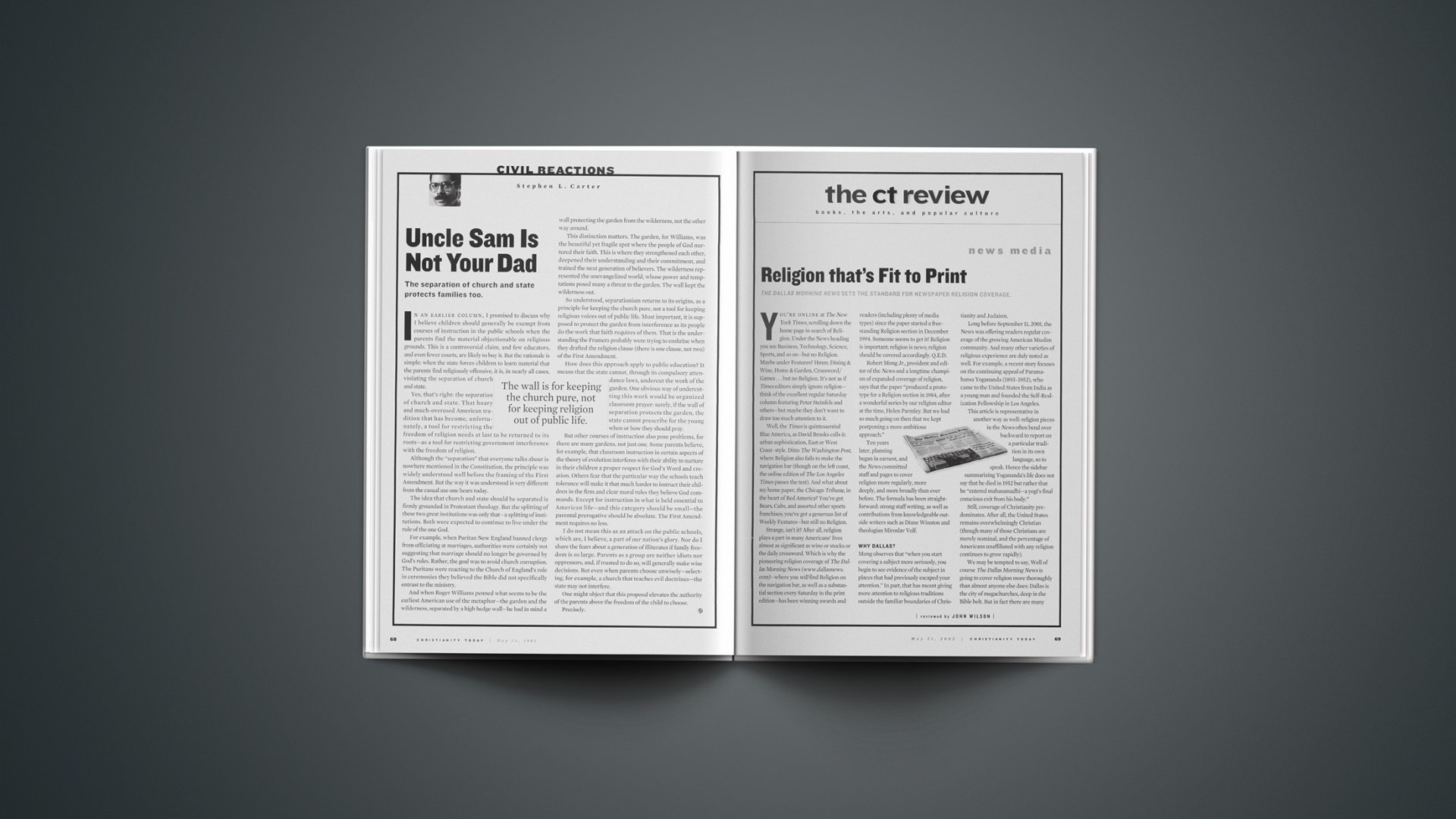In an earlier column, I promised to discuss why I believe children should generally be exempt from courses of instruction in the public schools when the parents find the material objectionable on religious grounds. This is a controversial claim, and few educators, and even fewer courts, are likely to buy it. But the rationale is simple: when the state forces children to learn material that the parents find religiously offensive, it is, in nearly all cases, violating the separation of church and state.
Yes, that’s right: the separation of church and state. That hoary and much-overused American tradition that has become, unfortunately, a tool for restricting the freedom of religion needs at last to be returned to its roots—as a tool for restricting government interference with the freedom of religion.
Although the “separation” that everyone talks about is nowhere mentioned in the Constitution, the principle was widely understood well before the framing of the First Amendment. But the way it was understood is very different from the casual use one hears today.
The idea that church and state should be separated is firmly grounded in Protestant theology. But the splitting of these two great institutions was only that—a splitting of institutions. Both were expected to continue to live under the rule of the one God.
For example, when Puritan New England banned clergy from officiating at marriages, authorities were certainly not suggesting that marriage should no longer be governed by God’s rules. Rather, the goal was to avoid church corruption. The Puritans were reacting to the Church of England’s role in ceremonies they believed the Bible did not specifically entrust to the ministry.
And when Roger Williams penned what seems to be the earliest American use of the metaphor—the garden and the wilderness, separated by a high hedge wall—he had in mind a wall protecting the garden from the wilderness, not the other way around.
This distinction matters. The garden, for Williams, was the beautiful yet fragile spot where the people of God nurtured their faith. This is where they strengthened each other, deepened their understanding and their commitment, and trained the next generation of believers. The wilderness represented the unevangelized world, whose power and temptations posed many a threat to the garden. The wall kept the wilderness out.
So understood, separationism returns to its origins, as a principle for keeping the church pure, not a tool for keeping religious voices out of public life. Most important, it is supposed to protect the garden from interference as its people do the work that faith requires of them. That is the understanding the Framers probably were trying to enshrine when they drafted the religion clause (there is one clause, not two) of the First Amendment.
How does this approach apply to public education? It means that the state cannot, through its compulsory attendance laws, undercut the work of the garden. One obvious way of undercutting this work would be organized classroom prayer: surely, if the wall of separation protects the garden, the state cannot prescribe for the young when or how they should pray.
But other courses of instruction also pose problems, for there are many gardens, not just one. Some parents believe, for example, that classroom instruction in certain aspects of the theory of evolution interferes with their ability to nurture in their children a proper respect for God’s Word and creation. Others fear that the particular way the schools teach tolerance will make it that much harder to instruct their children in the firm and clear moral rules they believe God commands. Except for instruction in what is held essential to American life—and this category should be small—the parental prerogative should be absolute. The First Amendment requires no less.
I do not mean this as an attack on the public schools, which are, I believe, a part of our nation’s glory. Nor do I share the fears about a generation of illiterates if family freedom is so large. Parents as a group are neither idiots nor oppressors, and, if trusted to do so, will generally make wise decisions. But even when parents choose unwisely—selecting, for example, a church that teaches evil doctrines—the state may not interfere.
One might object that this proposal elevates the authority of the parents above the freedom of the child to choose.
Precisely.
Copyright © 2002 Christianity Today. Click for reprint information.
Related Elsewhere
A ready-to-download Bible Study on this article is available at ChristianBibleStudies.com. These unique Bible studies use articles from current issues of Christianity Today to prompt thought-provoking discussions in adult Sunday school classes or small groups.
Stephen L. Carter’s previous column on church and state separation in schools was February’s “A Quiet Compromise.”
Recent Christianity Today columns by Stephen L. Carter include:
A Quiet CompromiseWhy a moment of silence is better than school prayer. (Feb. 25, 2002)
Leaving ‘Normal’ BehindLife before September 11 seemed more secure, but do we really want it back? (Dec. 4, 2001)
Rudeness Has a First NameInstant informality actually sabotages true friendship. (Nov. 2, 2001)
Why Rules RuleDebates on the Ten Commandments expose our culture’s ultimate rift. (Sept. 6, 2001)
We Interrupt This ChildhoodParents who raise their children to do right face a barrage of resistance. (July 11, 2001)
And the Word Turned SecularChristians should count the cost of the state’s affirmation. (May 29, 2001)
Vouching for ParentsVouchers are not an attack on public schools but a vote of trust in families. (Apr. 2, 2001)
The Courage to LoseIn elections, and in life, there is something more important than winning. (Feb. 6, 2001)










